University Research Report: Cryptocurrencies and Islamic Finance
VerifiedAdded on 2022/10/12
|11
|1921
|376
Report
AI Summary
This research report investigates the role and permissibility of cryptocurrencies within Islamic finance, examining the concepts of "Halal" and "Haram" in the context of blockchain technology adoption. The report provides a comprehensive overview, beginning with an introduction to the research background, rationale, aims, and objectives, along with the development of hypotheses and the structure of the research. It explores the basic conceptions of cryptocurrencies and their permissibility in Islamic finance, including a discussion of the Theory of Digital Economy and the factors impacting cryptocurrencies on Islamic finance. The methodology section details the research philosophy (positivism), approach (deductive), design (descriptive), and techniques, including both qualitative and quantitative data collection methods. The study includes a sample size of 60 executives and 5 managers from Islamic banks. The report concludes with a summary of the research, its ethical considerations, and a list of references. The research aims to identify the conception of cryptocurrencies, recognize their permissibility in Islamic Finance, find out the theoretical framework related to the digital economy, and determine the factors of cryptocurrencies that impact on Islamic Finance.
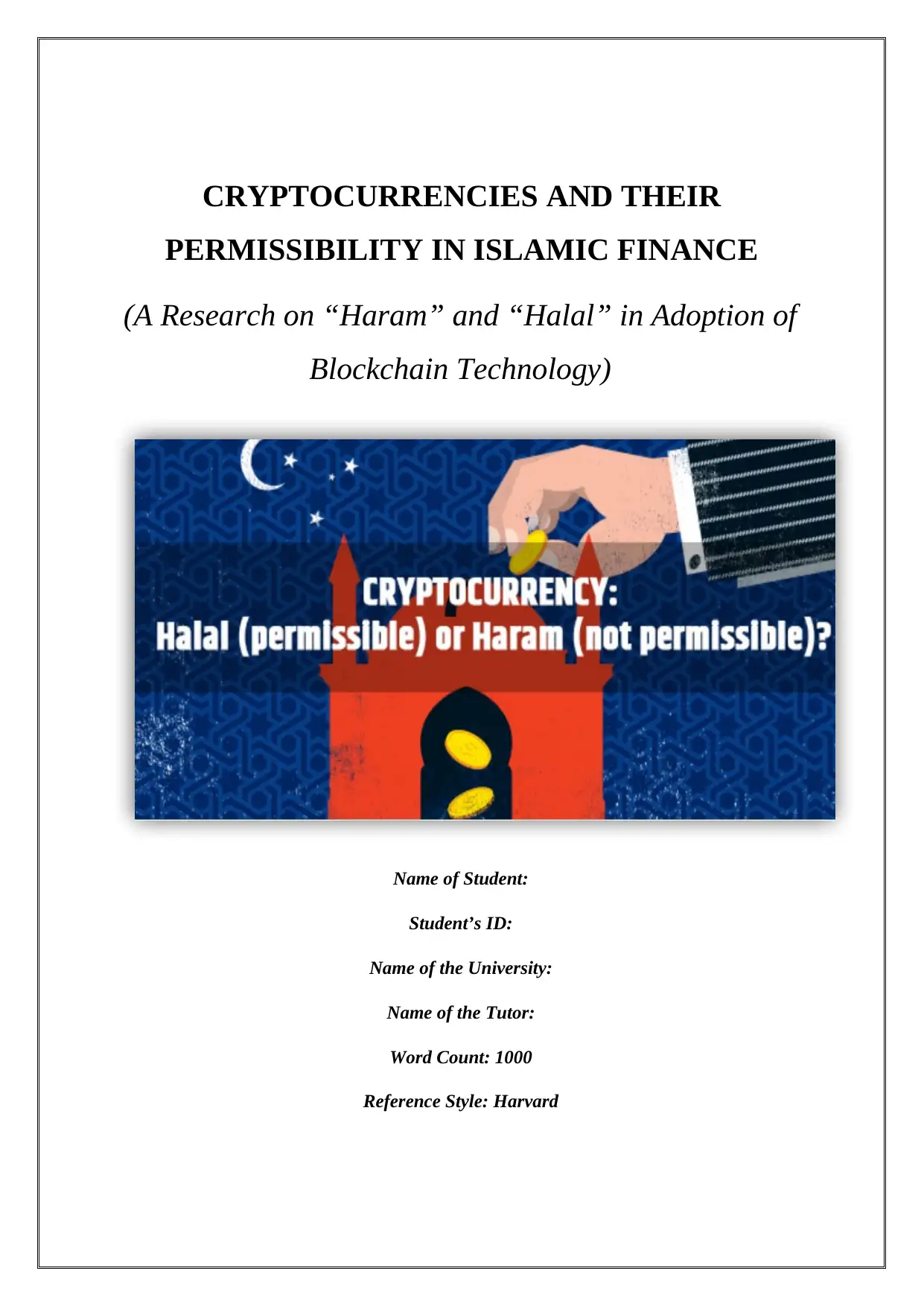
CRYPTOCURRENCIES AND THEIR
PERMISSIBILITY IN ISLAMIC FINANCE
(A Research on “Haram” and “Halal” in Adoption of
Blockchain Technology)
Name of Student:
Student’s ID:
Name of the University:
Name of the Tutor:
Word Count: 1000
Reference Style: Harvard
PERMISSIBILITY IN ISLAMIC FINANCE
(A Research on “Haram” and “Halal” in Adoption of
Blockchain Technology)
Name of Student:
Student’s ID:
Name of the University:
Name of the Tutor:
Word Count: 1000
Reference Style: Harvard
Paraphrase This Document
Need a fresh take? Get an instant paraphrase of this document with our AI Paraphraser
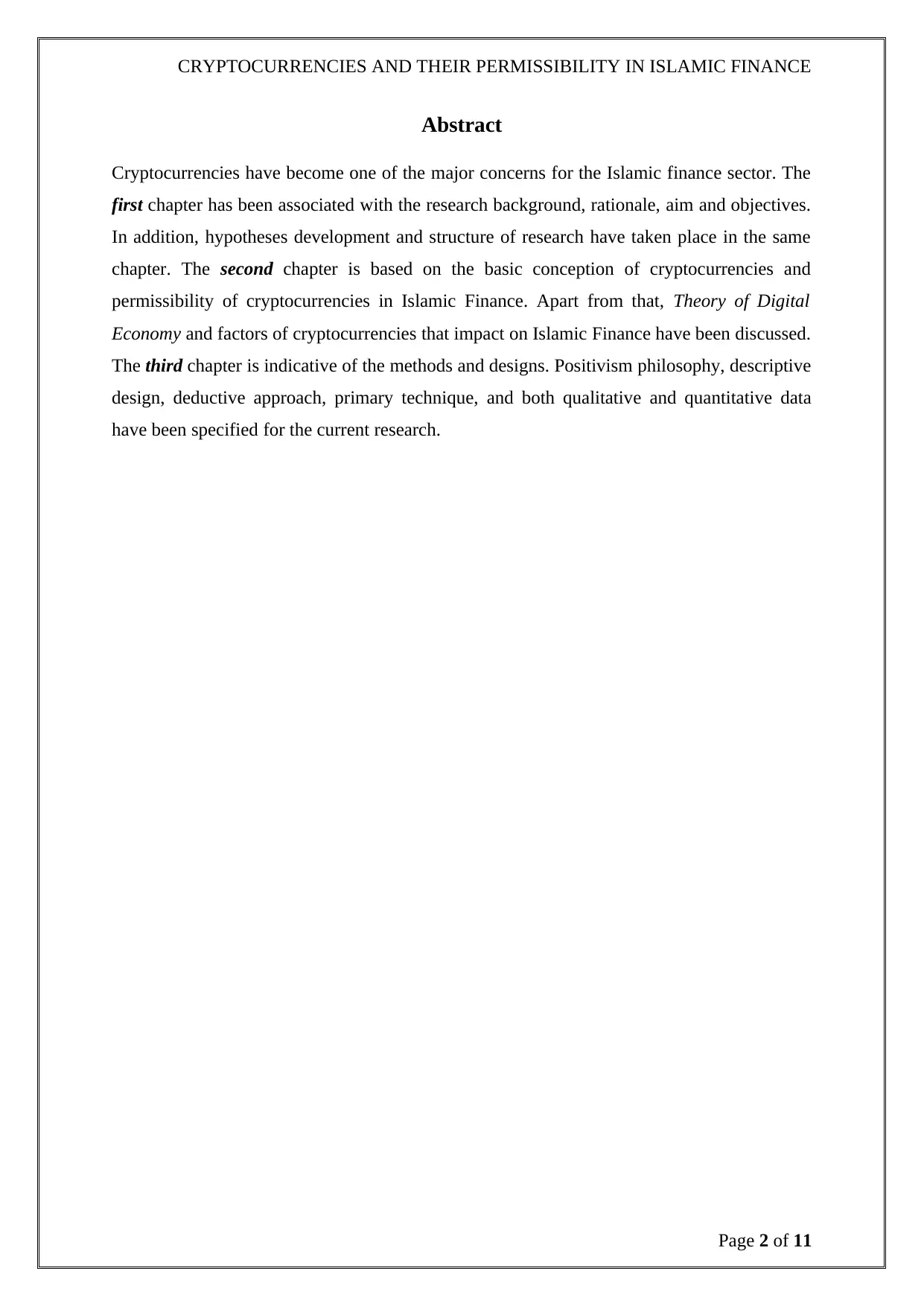
CRYPTOCURRENCIES AND THEIR PERMISSIBILITY IN ISLAMIC FINANCE
Abstract
Cryptocurrencies have become one of the major concerns for the Islamic finance sector. The
first chapter has been associated with the research background, rationale, aim and objectives.
In addition, hypotheses development and structure of research have taken place in the same
chapter. The second chapter is based on the basic conception of cryptocurrencies and
permissibility of cryptocurrencies in Islamic Finance. Apart from that, Theory of Digital
Economy and factors of cryptocurrencies that impact on Islamic Finance have been discussed.
The third chapter is indicative of the methods and designs. Positivism philosophy, descriptive
design, deductive approach, primary technique, and both qualitative and quantitative data
have been specified for the current research.
Page 2 of 11
Abstract
Cryptocurrencies have become one of the major concerns for the Islamic finance sector. The
first chapter has been associated with the research background, rationale, aim and objectives.
In addition, hypotheses development and structure of research have taken place in the same
chapter. The second chapter is based on the basic conception of cryptocurrencies and
permissibility of cryptocurrencies in Islamic Finance. Apart from that, Theory of Digital
Economy and factors of cryptocurrencies that impact on Islamic Finance have been discussed.
The third chapter is indicative of the methods and designs. Positivism philosophy, descriptive
design, deductive approach, primary technique, and both qualitative and quantitative data
have been specified for the current research.
Page 2 of 11
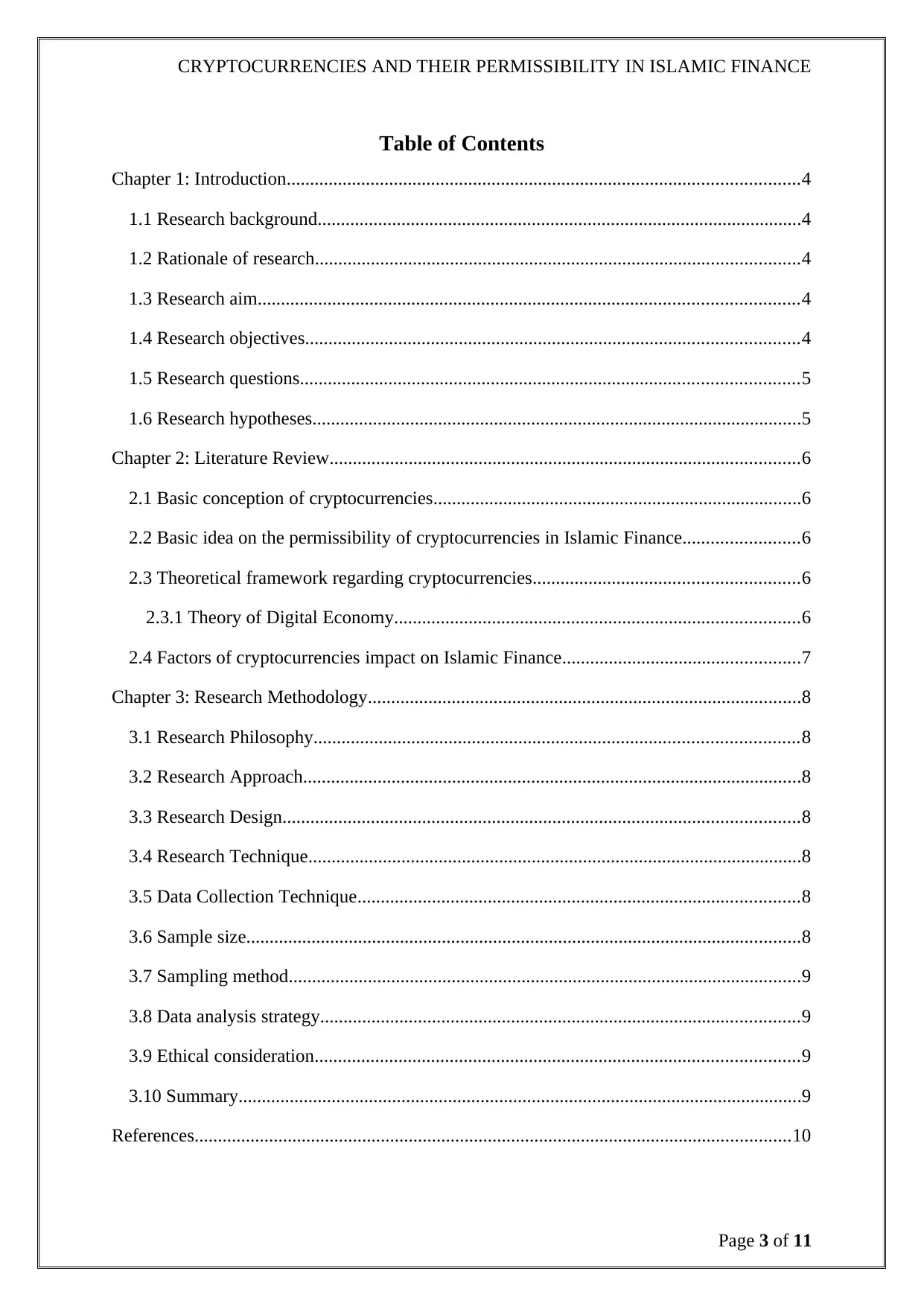
CRYPTOCURRENCIES AND THEIR PERMISSIBILITY IN ISLAMIC FINANCE
Table of Contents
Chapter 1: Introduction..............................................................................................................4
1.1 Research background........................................................................................................4
1.2 Rationale of research........................................................................................................4
1.3 Research aim....................................................................................................................4
1.4 Research objectives..........................................................................................................4
1.5 Research questions...........................................................................................................5
1.6 Research hypotheses.........................................................................................................5
Chapter 2: Literature Review.....................................................................................................6
2.1 Basic conception of cryptocurrencies...............................................................................6
2.2 Basic idea on the permissibility of cryptocurrencies in Islamic Finance.........................6
2.3 Theoretical framework regarding cryptocurrencies.........................................................6
2.3.1 Theory of Digital Economy.......................................................................................6
2.4 Factors of cryptocurrencies impact on Islamic Finance...................................................7
Chapter 3: Research Methodology.............................................................................................8
3.1 Research Philosophy........................................................................................................8
3.2 Research Approach...........................................................................................................8
3.3 Research Design...............................................................................................................8
3.4 Research Technique..........................................................................................................8
3.5 Data Collection Technique...............................................................................................8
3.6 Sample size.......................................................................................................................8
3.7 Sampling method..............................................................................................................9
3.8 Data analysis strategy.......................................................................................................9
3.9 Ethical consideration........................................................................................................9
3.10 Summary.........................................................................................................................9
References................................................................................................................................10
Page 3 of 11
Table of Contents
Chapter 1: Introduction..............................................................................................................4
1.1 Research background........................................................................................................4
1.2 Rationale of research........................................................................................................4
1.3 Research aim....................................................................................................................4
1.4 Research objectives..........................................................................................................4
1.5 Research questions...........................................................................................................5
1.6 Research hypotheses.........................................................................................................5
Chapter 2: Literature Review.....................................................................................................6
2.1 Basic conception of cryptocurrencies...............................................................................6
2.2 Basic idea on the permissibility of cryptocurrencies in Islamic Finance.........................6
2.3 Theoretical framework regarding cryptocurrencies.........................................................6
2.3.1 Theory of Digital Economy.......................................................................................6
2.4 Factors of cryptocurrencies impact on Islamic Finance...................................................7
Chapter 3: Research Methodology.............................................................................................8
3.1 Research Philosophy........................................................................................................8
3.2 Research Approach...........................................................................................................8
3.3 Research Design...............................................................................................................8
3.4 Research Technique..........................................................................................................8
3.5 Data Collection Technique...............................................................................................8
3.6 Sample size.......................................................................................................................8
3.7 Sampling method..............................................................................................................9
3.8 Data analysis strategy.......................................................................................................9
3.9 Ethical consideration........................................................................................................9
3.10 Summary.........................................................................................................................9
References................................................................................................................................10
Page 3 of 11
⊘ This is a preview!⊘
Do you want full access?
Subscribe today to unlock all pages.

Trusted by 1+ million students worldwide
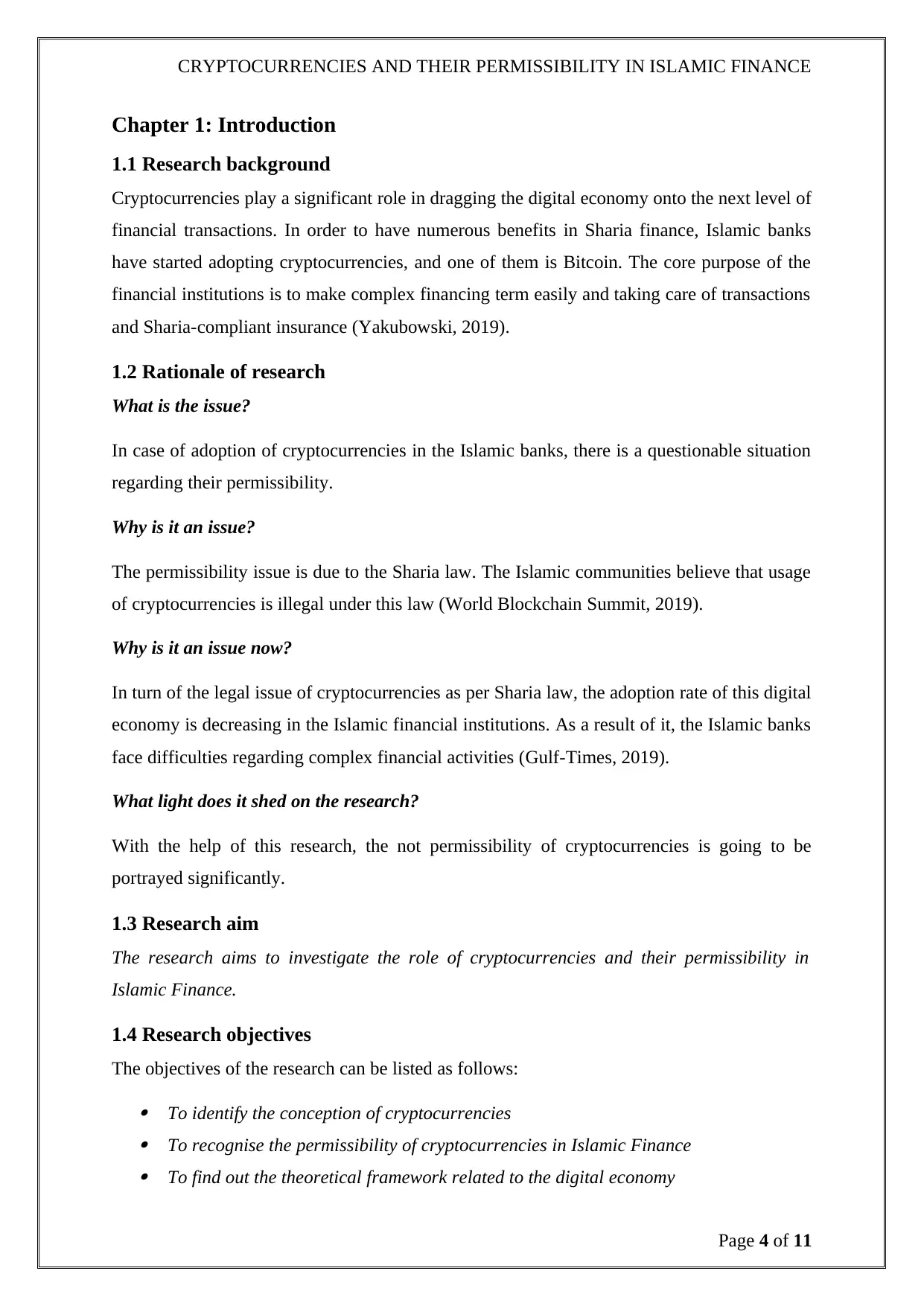
CRYPTOCURRENCIES AND THEIR PERMISSIBILITY IN ISLAMIC FINANCE
Chapter 1: Introduction
1.1 Research background
Cryptocurrencies play a significant role in dragging the digital economy onto the next level of
financial transactions. In order to have numerous benefits in Sharia finance, Islamic banks
have started adopting cryptocurrencies, and one of them is Bitcoin. The core purpose of the
financial institutions is to make complex financing term easily and taking care of transactions
and Sharia-compliant insurance (Yakubowski, 2019).
1.2 Rationale of research
What is the issue?
In case of adoption of cryptocurrencies in the Islamic banks, there is a questionable situation
regarding their permissibility.
Why is it an issue?
The permissibility issue is due to the Sharia law. The Islamic communities believe that usage
of cryptocurrencies is illegal under this law (World Blockchain Summit, 2019).
Why is it an issue now?
In turn of the legal issue of cryptocurrencies as per Sharia law, the adoption rate of this digital
economy is decreasing in the Islamic financial institutions. As a result of it, the Islamic banks
face difficulties regarding complex financial activities (Gulf-Times, 2019).
What light does it shed on the research?
With the help of this research, the not permissibility of cryptocurrencies is going to be
portrayed significantly.
1.3 Research aim
The research aims to investigate the role of cryptocurrencies and their permissibility in
Islamic Finance.
1.4 Research objectives
The objectives of the research can be listed as follows: To identify the conception of cryptocurrencies To recognise the permissibility of cryptocurrencies in Islamic Finance To find out the theoretical framework related to the digital economy
Page 4 of 11
Chapter 1: Introduction
1.1 Research background
Cryptocurrencies play a significant role in dragging the digital economy onto the next level of
financial transactions. In order to have numerous benefits in Sharia finance, Islamic banks
have started adopting cryptocurrencies, and one of them is Bitcoin. The core purpose of the
financial institutions is to make complex financing term easily and taking care of transactions
and Sharia-compliant insurance (Yakubowski, 2019).
1.2 Rationale of research
What is the issue?
In case of adoption of cryptocurrencies in the Islamic banks, there is a questionable situation
regarding their permissibility.
Why is it an issue?
The permissibility issue is due to the Sharia law. The Islamic communities believe that usage
of cryptocurrencies is illegal under this law (World Blockchain Summit, 2019).
Why is it an issue now?
In turn of the legal issue of cryptocurrencies as per Sharia law, the adoption rate of this digital
economy is decreasing in the Islamic financial institutions. As a result of it, the Islamic banks
face difficulties regarding complex financial activities (Gulf-Times, 2019).
What light does it shed on the research?
With the help of this research, the not permissibility of cryptocurrencies is going to be
portrayed significantly.
1.3 Research aim
The research aims to investigate the role of cryptocurrencies and their permissibility in
Islamic Finance.
1.4 Research objectives
The objectives of the research can be listed as follows: To identify the conception of cryptocurrencies To recognise the permissibility of cryptocurrencies in Islamic Finance To find out the theoretical framework related to the digital economy
Page 4 of 11
Paraphrase This Document
Need a fresh take? Get an instant paraphrase of this document with our AI Paraphraser
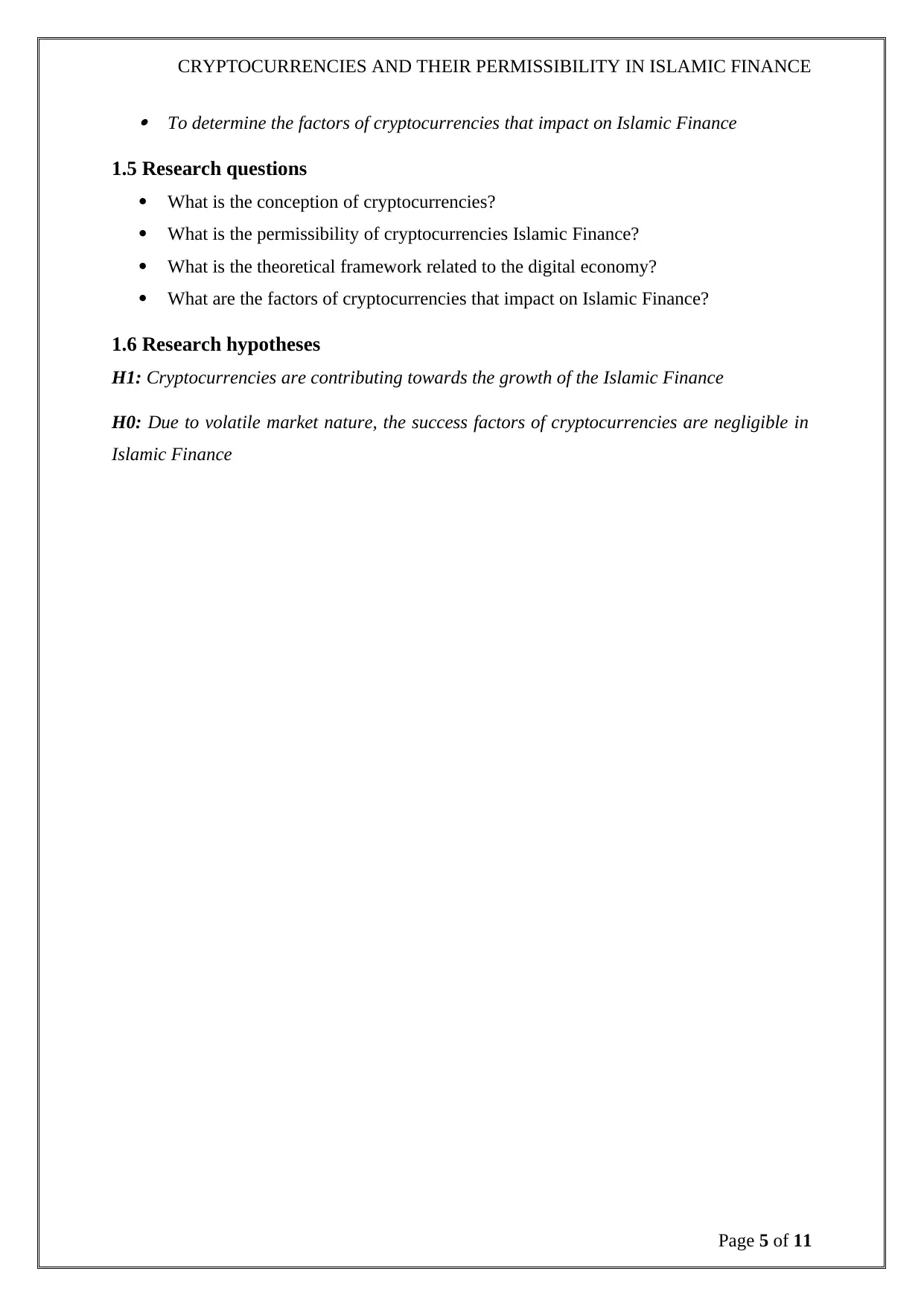
CRYPTOCURRENCIES AND THEIR PERMISSIBILITY IN ISLAMIC FINANCE
To determine the factors of cryptocurrencies that impact on Islamic Finance
1.5 Research questions
What is the conception of cryptocurrencies?
What is the permissibility of cryptocurrencies Islamic Finance?
What is the theoretical framework related to the digital economy?
What are the factors of cryptocurrencies that impact on Islamic Finance?
1.6 Research hypotheses
H1: Cryptocurrencies are contributing towards the growth of the Islamic Finance
H0: Due to volatile market nature, the success factors of cryptocurrencies are negligible in
Islamic Finance
Page 5 of 11
To determine the factors of cryptocurrencies that impact on Islamic Finance
1.5 Research questions
What is the conception of cryptocurrencies?
What is the permissibility of cryptocurrencies Islamic Finance?
What is the theoretical framework related to the digital economy?
What are the factors of cryptocurrencies that impact on Islamic Finance?
1.6 Research hypotheses
H1: Cryptocurrencies are contributing towards the growth of the Islamic Finance
H0: Due to volatile market nature, the success factors of cryptocurrencies are negligible in
Islamic Finance
Page 5 of 11
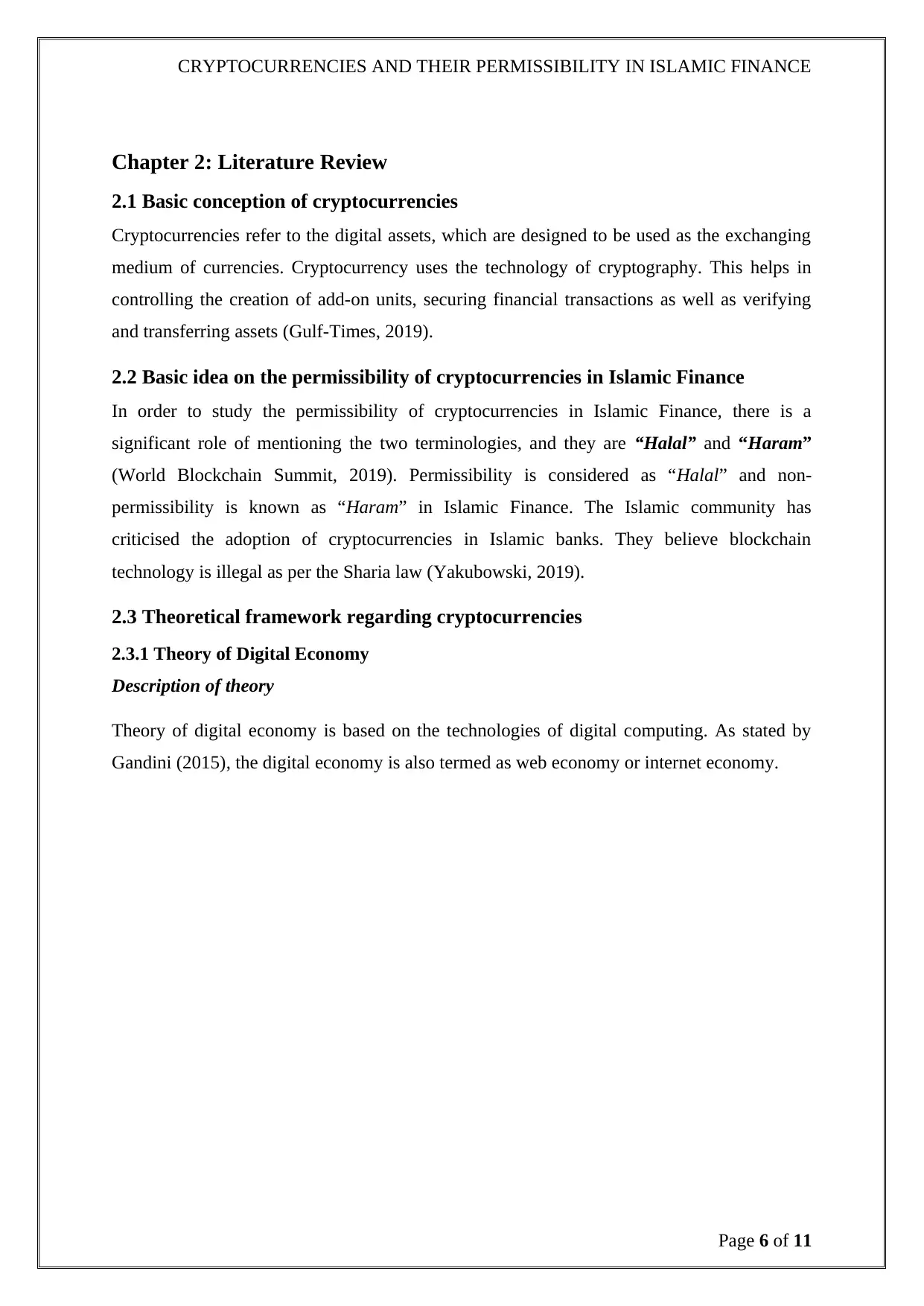
CRYPTOCURRENCIES AND THEIR PERMISSIBILITY IN ISLAMIC FINANCE
Chapter 2: Literature Review
2.1 Basic conception of cryptocurrencies
Cryptocurrencies refer to the digital assets, which are designed to be used as the exchanging
medium of currencies. Cryptocurrency uses the technology of cryptography. This helps in
controlling the creation of add-on units, securing financial transactions as well as verifying
and transferring assets (Gulf-Times, 2019).
2.2 Basic idea on the permissibility of cryptocurrencies in Islamic Finance
In order to study the permissibility of cryptocurrencies in Islamic Finance, there is a
significant role of mentioning the two terminologies, and they are “Halal” and “Haram”
(World Blockchain Summit, 2019). Permissibility is considered as “Halal” and non-
permissibility is known as “Haram” in Islamic Finance. The Islamic community has
criticised the adoption of cryptocurrencies in Islamic banks. They believe blockchain
technology is illegal as per the Sharia law (Yakubowski, 2019).
2.3 Theoretical framework regarding cryptocurrencies
2.3.1 Theory of Digital Economy
Description of theory
Theory of digital economy is based on the technologies of digital computing. As stated by
Gandini (2015), the digital economy is also termed as web economy or internet economy.
Page 6 of 11
Chapter 2: Literature Review
2.1 Basic conception of cryptocurrencies
Cryptocurrencies refer to the digital assets, which are designed to be used as the exchanging
medium of currencies. Cryptocurrency uses the technology of cryptography. This helps in
controlling the creation of add-on units, securing financial transactions as well as verifying
and transferring assets (Gulf-Times, 2019).
2.2 Basic idea on the permissibility of cryptocurrencies in Islamic Finance
In order to study the permissibility of cryptocurrencies in Islamic Finance, there is a
significant role of mentioning the two terminologies, and they are “Halal” and “Haram”
(World Blockchain Summit, 2019). Permissibility is considered as “Halal” and non-
permissibility is known as “Haram” in Islamic Finance. The Islamic community has
criticised the adoption of cryptocurrencies in Islamic banks. They believe blockchain
technology is illegal as per the Sharia law (Yakubowski, 2019).
2.3 Theoretical framework regarding cryptocurrencies
2.3.1 Theory of Digital Economy
Description of theory
Theory of digital economy is based on the technologies of digital computing. As stated by
Gandini (2015), the digital economy is also termed as web economy or internet economy.
Page 6 of 11
⊘ This is a preview!⊘
Do you want full access?
Subscribe today to unlock all pages.

Trusted by 1+ million students worldwide
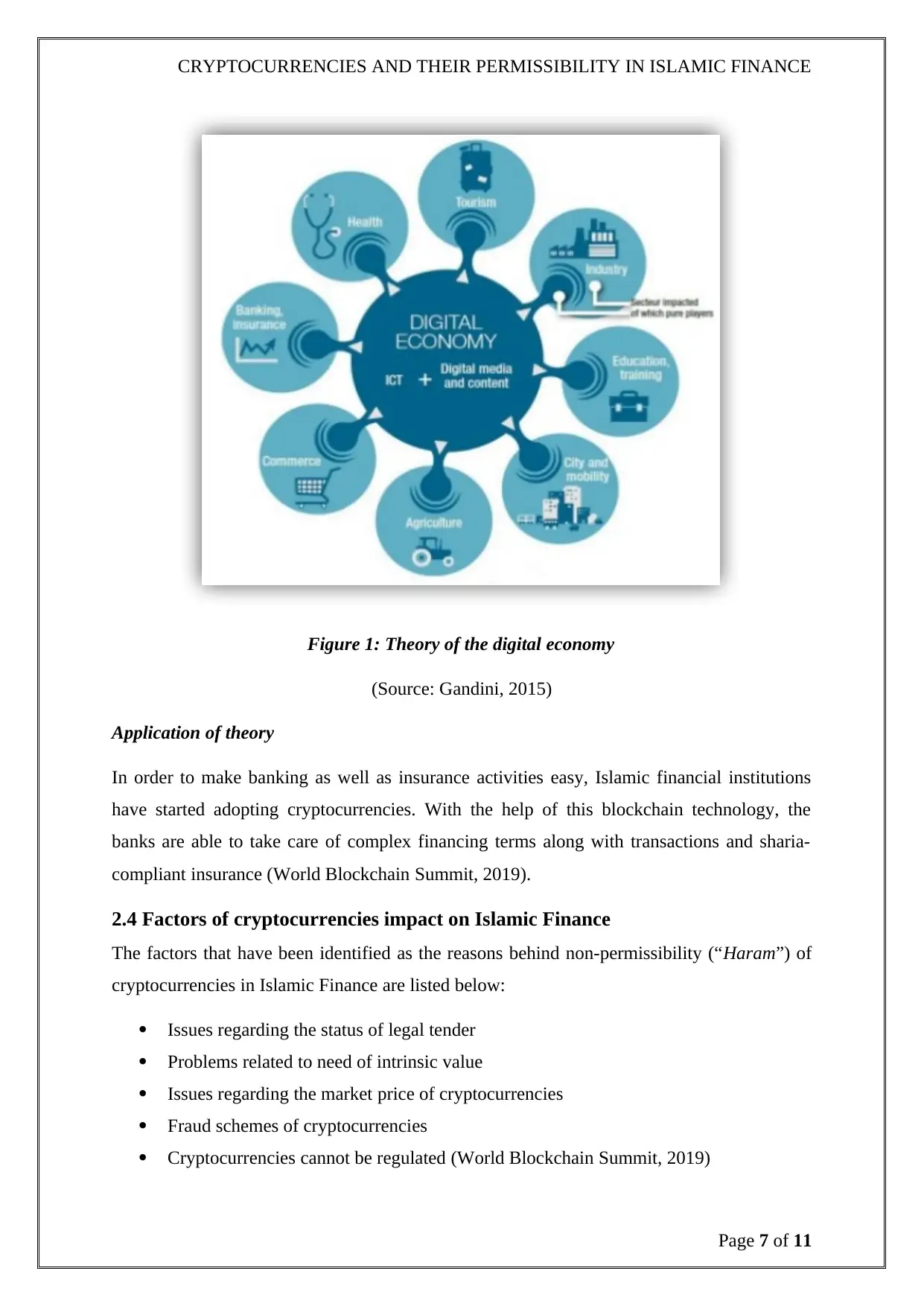
CRYPTOCURRENCIES AND THEIR PERMISSIBILITY IN ISLAMIC FINANCE
Figure 1: Theory of the digital economy
(Source: Gandini, 2015)
Application of theory
In order to make banking as well as insurance activities easy, Islamic financial institutions
have started adopting cryptocurrencies. With the help of this blockchain technology, the
banks are able to take care of complex financing terms along with transactions and sharia-
compliant insurance (World Blockchain Summit, 2019).
2.4 Factors of cryptocurrencies impact on Islamic Finance
The factors that have been identified as the reasons behind non-permissibility (“Haram”) of
cryptocurrencies in Islamic Finance are listed below:
Issues regarding the status of legal tender
Problems related to need of intrinsic value
Issues regarding the market price of cryptocurrencies
Fraud schemes of cryptocurrencies
Cryptocurrencies cannot be regulated (World Blockchain Summit, 2019)
Page 7 of 11
Figure 1: Theory of the digital economy
(Source: Gandini, 2015)
Application of theory
In order to make banking as well as insurance activities easy, Islamic financial institutions
have started adopting cryptocurrencies. With the help of this blockchain technology, the
banks are able to take care of complex financing terms along with transactions and sharia-
compliant insurance (World Blockchain Summit, 2019).
2.4 Factors of cryptocurrencies impact on Islamic Finance
The factors that have been identified as the reasons behind non-permissibility (“Haram”) of
cryptocurrencies in Islamic Finance are listed below:
Issues regarding the status of legal tender
Problems related to need of intrinsic value
Issues regarding the market price of cryptocurrencies
Fraud schemes of cryptocurrencies
Cryptocurrencies cannot be regulated (World Blockchain Summit, 2019)
Page 7 of 11
Paraphrase This Document
Need a fresh take? Get an instant paraphrase of this document with our AI Paraphraser
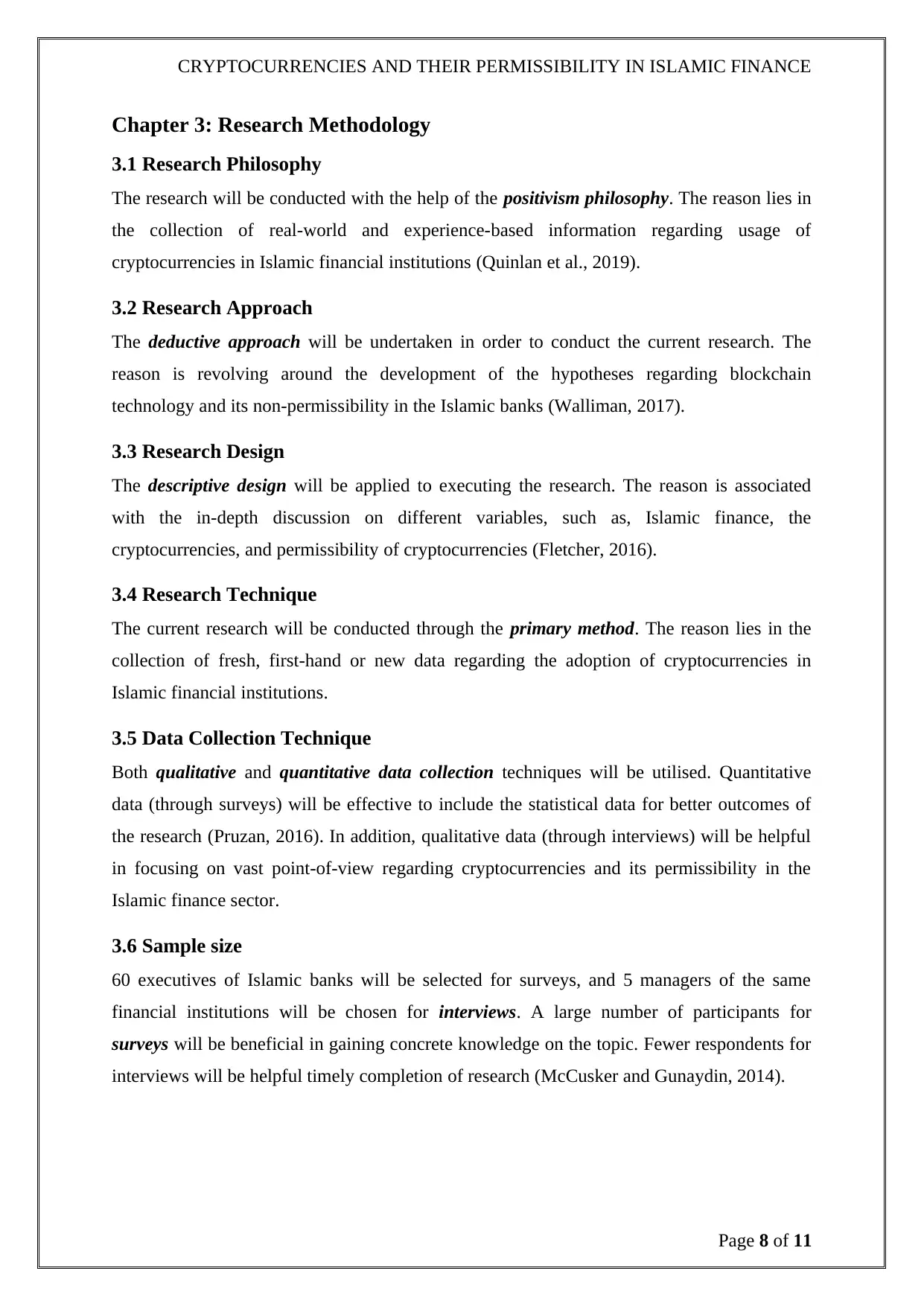
CRYPTOCURRENCIES AND THEIR PERMISSIBILITY IN ISLAMIC FINANCE
Chapter 3: Research Methodology
3.1 Research Philosophy
The research will be conducted with the help of the positivism philosophy. The reason lies in
the collection of real-world and experience-based information regarding usage of
cryptocurrencies in Islamic financial institutions (Quinlan et al., 2019).
3.2 Research Approach
The deductive approach will be undertaken in order to conduct the current research. The
reason is revolving around the development of the hypotheses regarding blockchain
technology and its non-permissibility in the Islamic banks (Walliman, 2017).
3.3 Research Design
The descriptive design will be applied to executing the research. The reason is associated
with the in-depth discussion on different variables, such as, Islamic finance, the
cryptocurrencies, and permissibility of cryptocurrencies (Fletcher, 2016).
3.4 Research Technique
The current research will be conducted through the primary method. The reason lies in the
collection of fresh, first-hand or new data regarding the adoption of cryptocurrencies in
Islamic financial institutions.
3.5 Data Collection Technique
Both qualitative and quantitative data collection techniques will be utilised. Quantitative
data (through surveys) will be effective to include the statistical data for better outcomes of
the research (Pruzan, 2016). In addition, qualitative data (through interviews) will be helpful
in focusing on vast point-of-view regarding cryptocurrencies and its permissibility in the
Islamic finance sector.
3.6 Sample size
60 executives of Islamic banks will be selected for surveys, and 5 managers of the same
financial institutions will be chosen for interviews. A large number of participants for
surveys will be beneficial in gaining concrete knowledge on the topic. Fewer respondents for
interviews will be helpful timely completion of research (McCusker and Gunaydin, 2014).
Page 8 of 11
Chapter 3: Research Methodology
3.1 Research Philosophy
The research will be conducted with the help of the positivism philosophy. The reason lies in
the collection of real-world and experience-based information regarding usage of
cryptocurrencies in Islamic financial institutions (Quinlan et al., 2019).
3.2 Research Approach
The deductive approach will be undertaken in order to conduct the current research. The
reason is revolving around the development of the hypotheses regarding blockchain
technology and its non-permissibility in the Islamic banks (Walliman, 2017).
3.3 Research Design
The descriptive design will be applied to executing the research. The reason is associated
with the in-depth discussion on different variables, such as, Islamic finance, the
cryptocurrencies, and permissibility of cryptocurrencies (Fletcher, 2016).
3.4 Research Technique
The current research will be conducted through the primary method. The reason lies in the
collection of fresh, first-hand or new data regarding the adoption of cryptocurrencies in
Islamic financial institutions.
3.5 Data Collection Technique
Both qualitative and quantitative data collection techniques will be utilised. Quantitative
data (through surveys) will be effective to include the statistical data for better outcomes of
the research (Pruzan, 2016). In addition, qualitative data (through interviews) will be helpful
in focusing on vast point-of-view regarding cryptocurrencies and its permissibility in the
Islamic finance sector.
3.6 Sample size
60 executives of Islamic banks will be selected for surveys, and 5 managers of the same
financial institutions will be chosen for interviews. A large number of participants for
surveys will be beneficial in gaining concrete knowledge on the topic. Fewer respondents for
interviews will be helpful timely completion of research (McCusker and Gunaydin, 2014).
Page 8 of 11
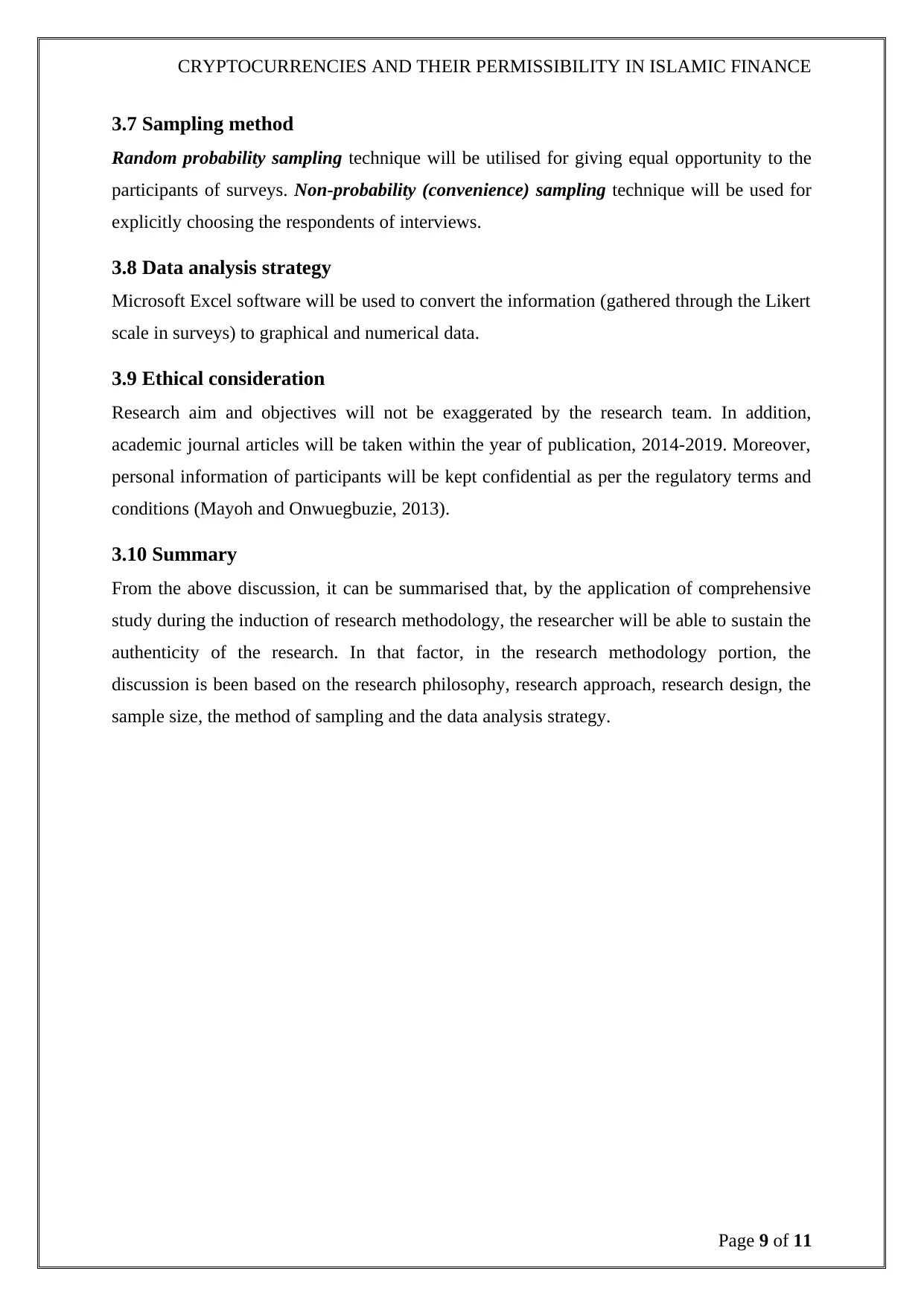
CRYPTOCURRENCIES AND THEIR PERMISSIBILITY IN ISLAMIC FINANCE
3.7 Sampling method
Random probability sampling technique will be utilised for giving equal opportunity to the
participants of surveys. Non-probability (convenience) sampling technique will be used for
explicitly choosing the respondents of interviews.
3.8 Data analysis strategy
Microsoft Excel software will be used to convert the information (gathered through the Likert
scale in surveys) to graphical and numerical data.
3.9 Ethical consideration
Research aim and objectives will not be exaggerated by the research team. In addition,
academic journal articles will be taken within the year of publication, 2014-2019. Moreover,
personal information of participants will be kept confidential as per the regulatory terms and
conditions (Mayoh and Onwuegbuzie, 2013).
3.10 Summary
From the above discussion, it can be summarised that, by the application of comprehensive
study during the induction of research methodology, the researcher will be able to sustain the
authenticity of the research. In that factor, in the research methodology portion, the
discussion is been based on the research philosophy, research approach, research design, the
sample size, the method of sampling and the data analysis strategy.
Page 9 of 11
3.7 Sampling method
Random probability sampling technique will be utilised for giving equal opportunity to the
participants of surveys. Non-probability (convenience) sampling technique will be used for
explicitly choosing the respondents of interviews.
3.8 Data analysis strategy
Microsoft Excel software will be used to convert the information (gathered through the Likert
scale in surveys) to graphical and numerical data.
3.9 Ethical consideration
Research aim and objectives will not be exaggerated by the research team. In addition,
academic journal articles will be taken within the year of publication, 2014-2019. Moreover,
personal information of participants will be kept confidential as per the regulatory terms and
conditions (Mayoh and Onwuegbuzie, 2013).
3.10 Summary
From the above discussion, it can be summarised that, by the application of comprehensive
study during the induction of research methodology, the researcher will be able to sustain the
authenticity of the research. In that factor, in the research methodology portion, the
discussion is been based on the research philosophy, research approach, research design, the
sample size, the method of sampling and the data analysis strategy.
Page 9 of 11
⊘ This is a preview!⊘
Do you want full access?
Subscribe today to unlock all pages.

Trusted by 1+ million students worldwide
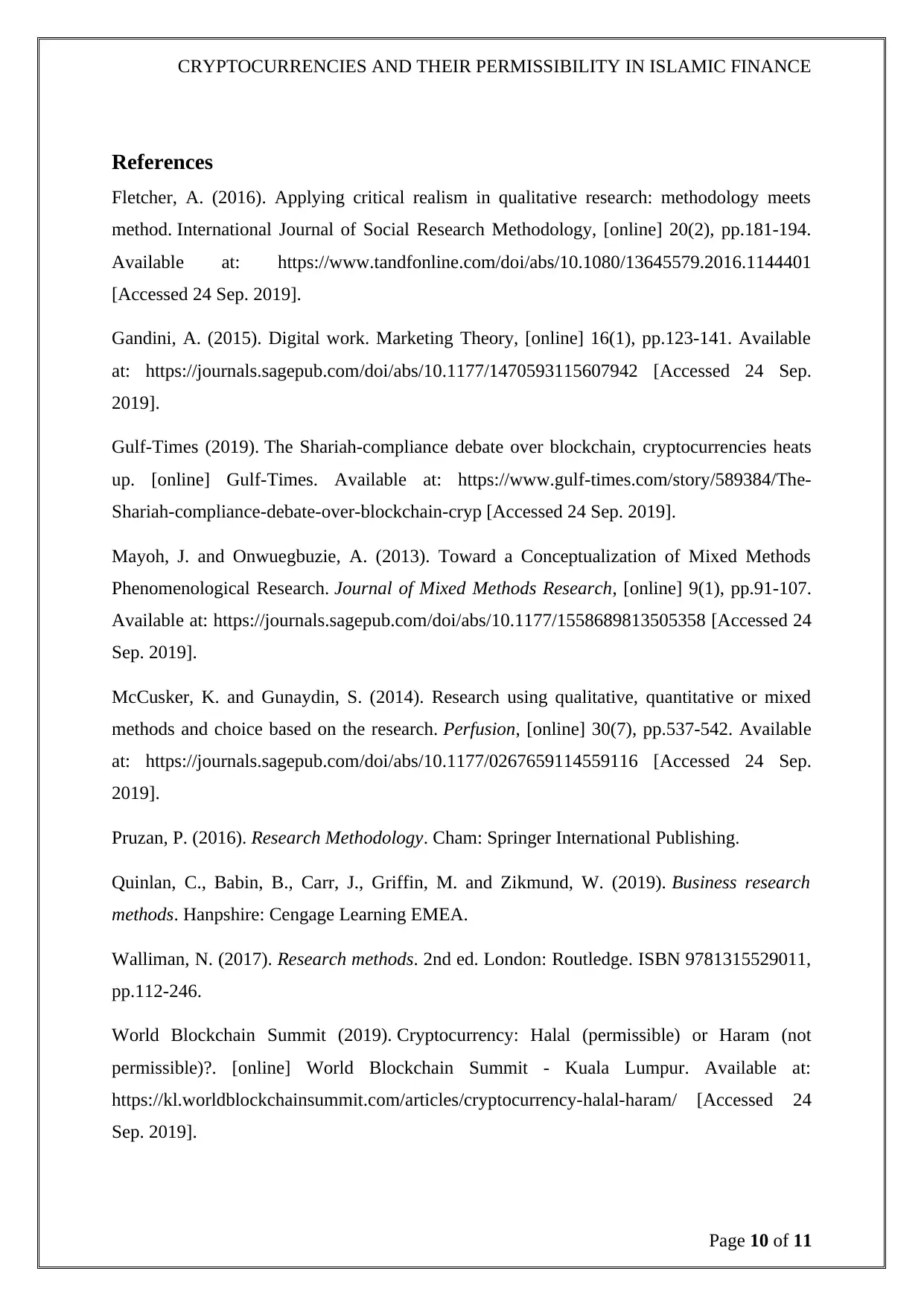
CRYPTOCURRENCIES AND THEIR PERMISSIBILITY IN ISLAMIC FINANCE
References
Fletcher, A. (2016). Applying critical realism in qualitative research: methodology meets
method. International Journal of Social Research Methodology, [online] 20(2), pp.181-194.
Available at: https://www.tandfonline.com/doi/abs/10.1080/13645579.2016.1144401
[Accessed 24 Sep. 2019].
Gandini, A. (2015). Digital work. Marketing Theory, [online] 16(1), pp.123-141. Available
at: https://journals.sagepub.com/doi/abs/10.1177/1470593115607942 [Accessed 24 Sep.
2019].
Gulf-Times (2019). The Shariah-compliance debate over blockchain, cryptocurrencies heats
up. [online] Gulf-Times. Available at: https://www.gulf-times.com/story/589384/The-
Shariah-compliance-debate-over-blockchain-cryp [Accessed 24 Sep. 2019].
Mayoh, J. and Onwuegbuzie, A. (2013). Toward a Conceptualization of Mixed Methods
Phenomenological Research. Journal of Mixed Methods Research, [online] 9(1), pp.91-107.
Available at: https://journals.sagepub.com/doi/abs/10.1177/1558689813505358 [Accessed 24
Sep. 2019].
McCusker, K. and Gunaydin, S. (2014). Research using qualitative, quantitative or mixed
methods and choice based on the research. Perfusion, [online] 30(7), pp.537-542. Available
at: https://journals.sagepub.com/doi/abs/10.1177/0267659114559116 [Accessed 24 Sep.
2019].
Pruzan, P. (2016). Research Methodology. Cham: Springer International Publishing.
Quinlan, C., Babin, B., Carr, J., Griffin, M. and Zikmund, W. (2019). Business research
methods. Hanpshire: Cengage Learning EMEA.
Walliman, N. (2017). Research methods. 2nd ed. London: Routledge. ISBN 9781315529011,
pp.112-246.
World Blockchain Summit (2019). Cryptocurrency: Halal (permissible) or Haram (not
permissible)?. [online] World Blockchain Summit - Kuala Lumpur. Available at:
https://kl.worldblockchainsummit.com/articles/cryptocurrency-halal-haram/ [Accessed 24
Sep. 2019].
Page 10 of 11
References
Fletcher, A. (2016). Applying critical realism in qualitative research: methodology meets
method. International Journal of Social Research Methodology, [online] 20(2), pp.181-194.
Available at: https://www.tandfonline.com/doi/abs/10.1080/13645579.2016.1144401
[Accessed 24 Sep. 2019].
Gandini, A. (2015). Digital work. Marketing Theory, [online] 16(1), pp.123-141. Available
at: https://journals.sagepub.com/doi/abs/10.1177/1470593115607942 [Accessed 24 Sep.
2019].
Gulf-Times (2019). The Shariah-compliance debate over blockchain, cryptocurrencies heats
up. [online] Gulf-Times. Available at: https://www.gulf-times.com/story/589384/The-
Shariah-compliance-debate-over-blockchain-cryp [Accessed 24 Sep. 2019].
Mayoh, J. and Onwuegbuzie, A. (2013). Toward a Conceptualization of Mixed Methods
Phenomenological Research. Journal of Mixed Methods Research, [online] 9(1), pp.91-107.
Available at: https://journals.sagepub.com/doi/abs/10.1177/1558689813505358 [Accessed 24
Sep. 2019].
McCusker, K. and Gunaydin, S. (2014). Research using qualitative, quantitative or mixed
methods and choice based on the research. Perfusion, [online] 30(7), pp.537-542. Available
at: https://journals.sagepub.com/doi/abs/10.1177/0267659114559116 [Accessed 24 Sep.
2019].
Pruzan, P. (2016). Research Methodology. Cham: Springer International Publishing.
Quinlan, C., Babin, B., Carr, J., Griffin, M. and Zikmund, W. (2019). Business research
methods. Hanpshire: Cengage Learning EMEA.
Walliman, N. (2017). Research methods. 2nd ed. London: Routledge. ISBN 9781315529011,
pp.112-246.
World Blockchain Summit (2019). Cryptocurrency: Halal (permissible) or Haram (not
permissible)?. [online] World Blockchain Summit - Kuala Lumpur. Available at:
https://kl.worldblockchainsummit.com/articles/cryptocurrency-halal-haram/ [Accessed 24
Sep. 2019].
Page 10 of 11
Paraphrase This Document
Need a fresh take? Get an instant paraphrase of this document with our AI Paraphraser
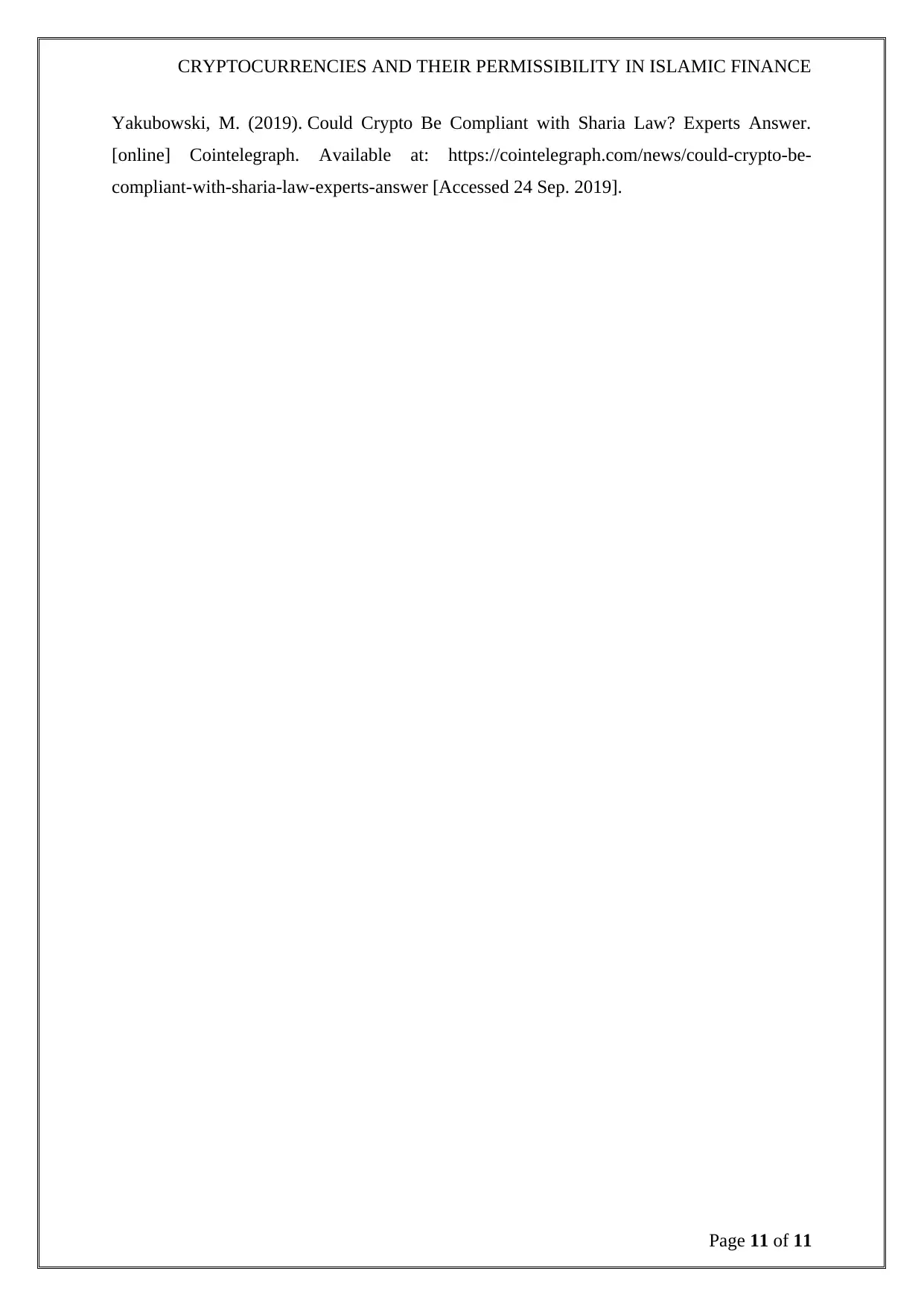
CRYPTOCURRENCIES AND THEIR PERMISSIBILITY IN ISLAMIC FINANCE
Yakubowski, M. (2019). Could Crypto Be Compliant with Sharia Law? Experts Answer.
[online] Cointelegraph. Available at: https://cointelegraph.com/news/could-crypto-be-
compliant-with-sharia-law-experts-answer [Accessed 24 Sep. 2019].
Page 11 of 11
Yakubowski, M. (2019). Could Crypto Be Compliant with Sharia Law? Experts Answer.
[online] Cointelegraph. Available at: https://cointelegraph.com/news/could-crypto-be-
compliant-with-sharia-law-experts-answer [Accessed 24 Sep. 2019].
Page 11 of 11
1 out of 11
Related Documents
Your All-in-One AI-Powered Toolkit for Academic Success.
+13062052269
info@desklib.com
Available 24*7 on WhatsApp / Email
![[object Object]](/_next/static/media/star-bottom.7253800d.svg)
Unlock your academic potential
Copyright © 2020–2026 A2Z Services. All Rights Reserved. Developed and managed by ZUCOL.





